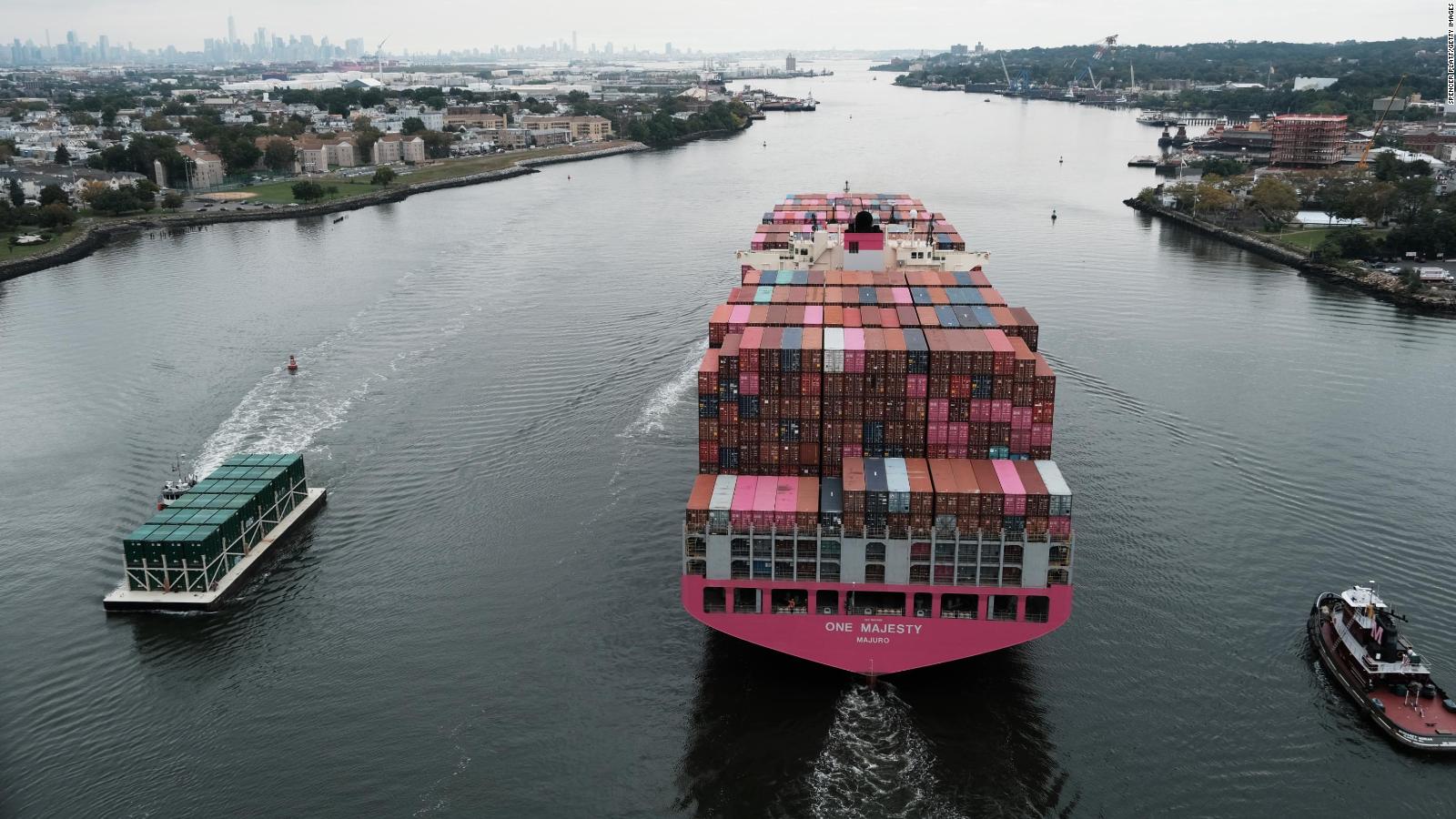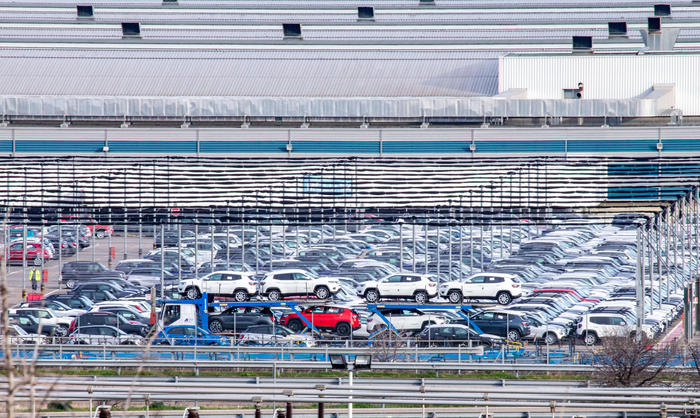Supply chain crisis could last until 2022 0:56
(CNN Spanish) -
From semiconductors to fuels, through toys, clothing and food, a long list of products for daily use are being affected by the crisis in the supply chain that is hitting the global economy, generating shortages and an increase in prices.
This crisis in the supply chain dates back to the start of the coronavirus pandemic in 2020, when tough restrictions to curb infections led to a sharp drop in demand and economic activity, putting the brakes on production.
There were also major closures at ports and factories due to case outbreaks.
Why is there a crisis in the global supply chain and how could it affect your daily life?
According to World Bank estimates, the global economy contracted 3.59% during 2020 and as a result of these restrictions.
The IMF projects a 6% rebound for 2021, in a context of slowing growth.
But as activity recovers and demand for goods rebuilds, world production is being affected by border controls and mobility restrictions - which create difficulties in finding sailors and drivers to transport goods. , the lack of investments during 2020, the increase in transportation costs due to the price of fuel and other factors.
advertising
Here are some of the products most affected by this supply chain crisis.
Food and drinks
In the United States, there have been abrupt price increases in soft drinks, tortillas - due to the lack of corn - and meat sold in stores.
In the case of beverages, the shortage of glass bottles from Asia is affecting the production of soft drinks, supermarket manager Erica Muñoz, based in Atlanta, told CNN.
He also indicated that meat has had increases of up to 30%.
High food prices due to supply chain crisis 3:04
Increases in the price of coffee are also expected due to bad weather in Brazil, protests in Colombia and high transportation costs.
Manufactured products
The cost of goods coming out of factories in China, the world's leading manufacturer, is rising at the highest rate ever, affecting consumption across the globe.
The producer price index - which measures the cost of goods sold to companies - soared 10.7% in September from a year ago, according to government data released Thursday.
This is the fastest increase since 1996, when the government began publishing this data, according to Eikon Refinitiv data.
Companies around the world sourcing goods from China are already struggling with port congestion, rising freight rates and delays.
Rising prices and declining production could pose further problems for global supply chains, which are already under enormous pressure.
5 hard-to-find products now 1:44
Of cars, clothes and toys
In the case of automobiles, Goldman Sachs warned in August of the fall in car inventories, which remain below levels prior to the coronavirus pandemic.
Meanwhile, the sportswear company Nike could run out of supplies of sports shoes from Vietnam, where the increase in infections has forced the temporary closure of factories, according to the consultancy S&P Global.
On the other hand, the shortage of containers, the limitation of cargo space on maritime vessels and rising costs have forced toy manufacturers to make numerous concessions about which goods make the most economic sense.
In this way, toy sellers in the United States have decided to prioritize small and soft toys for this Christmas season, since more of these fit in the containers.
High transportation costs and a shortage of containers are also causing problems in the supply chain.
Fuels
Demand for energy is skyrocketing around the world as the global economy reopens following restrictions imposed in 2020 to cope with the coronavirus.
But the offer is not keeping up.
China is having trouble meeting the demand for coal due to pandemic problems at its main supplier, Australia, but also heavy rains and a series of fatal accidents at its plants.
Also, recent government policies to reduce carbon emissions have had an impact on highly polluting coal production.
The price of thermal coal, which is used mainly to generate energy, has continued to rise.
Futures jumped 11% on Tuesday on the Zhengzhou Commodity Exchange to hit a new record of nearly 1,508 yuan (US $ 234) per metric ton.
This rise came after an 8% increase on Monday.
In Europe, the cost of wholesale natural gas has skyrocketed to record highs in the UK, France, Spain, Germany and Italy.
Household and business bills have already skyrocketed, and could rise even higher as the cold approaches and more fuel is needed for electricity generation and heating systems.
How long will the supply problems continue?
1:52
Meanwhile, high oil prices in the United States are once again above US $ 80 per barrel - these values have not reached these since 2014 - a blessing for the energy industry, hit during the pandemic, but bad news for the recovery economic as the boreal winter approaches.
On Monday the price of diesel fuel reached an all-time high at German gas stations, according to the German Automobile Association (ADAC).
The liter now costs an average of 1,555 euros (US $ 1,797, and has just surpassed the previous record (1,554 euros) of August 26.
While in the United Kingdom the lack of drivers to bring fuel from ports to service stations is generating a shortage of that product and long lines at petrol stations.
Semiconductors
Semiconductors, or chips, have been in short supply throughout 2021 and the shortage is expected to last until mid-2023, according to Intel.
These shortages affect numerous industries that use chips, such as the automotive industry and manufacturers of electronic products, including smartphones, making final products more expensive.
What happens to the supply chain in the world?
2:59
Among the reasons to explain this situation is the coronavirus pandemic, which plunged the world economy into recession last year.
In that context, automakers reduced chip orders, while technology companies, whose products were favored by the lockdown measures, monopolized all they could.
Other circumstances, such as US government sanctions on Chinese tech companies and extreme weather conditions, have also contributed to supply shortages.
In January 2021, automakers such as Ford, Nissan, Volkswagen and Toyota had to temporarily suspend production at some of their plants due to a lack of chips - an average car requires between 50 and 150 semiconductors.
New car sales were reported in October to have plummeted in the past three months in the United States despite strong demand, as computer chip shortages and other supply chain problems led to stoppages at auto factories. and they hampered the supply of vehicles.
supply chain


/cloudfront-eu-central-1.images.arcpublishing.com/prisa/5OUKK6GFCFFURIXRNYTXYSYQLU.jpg)











